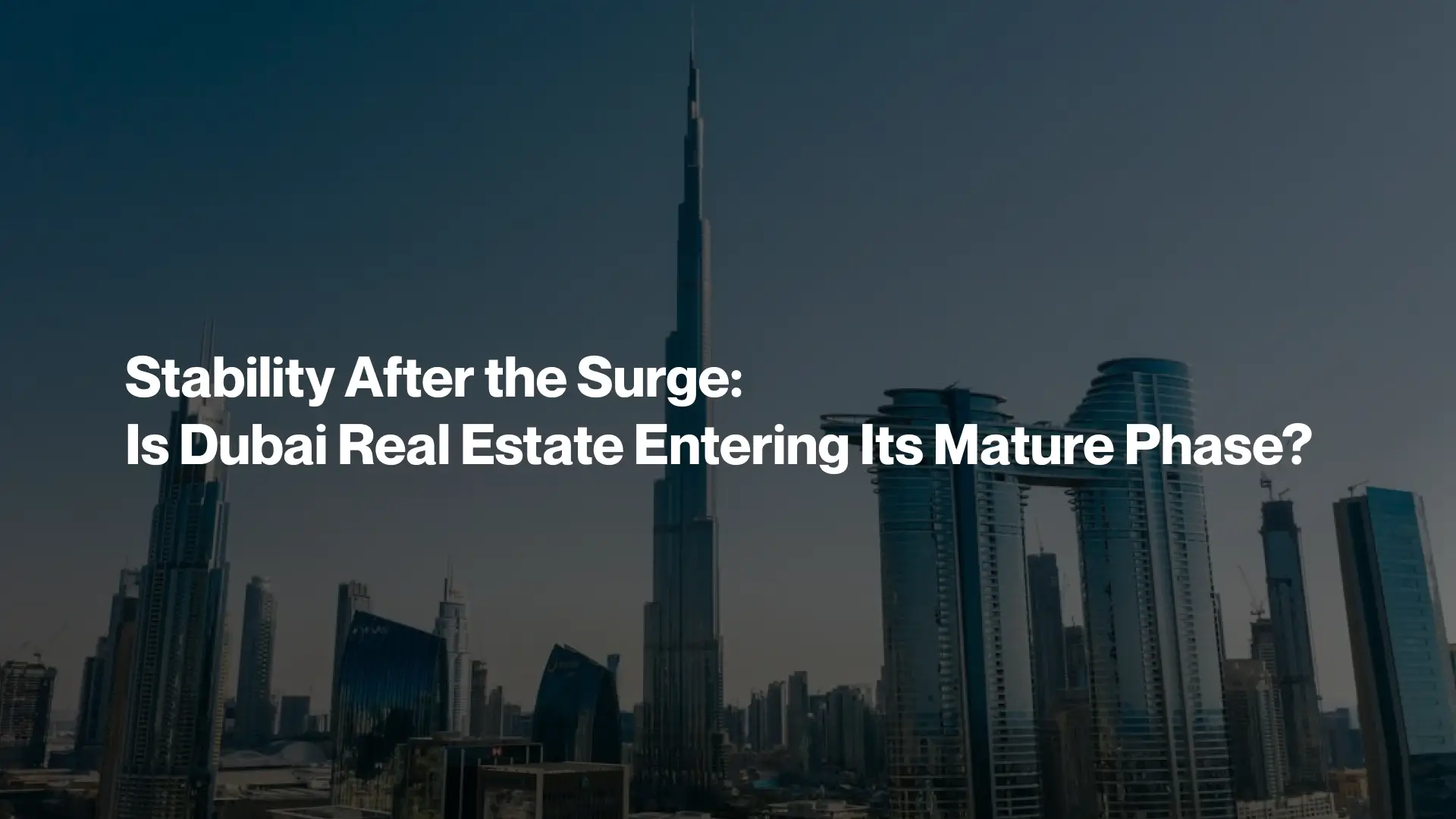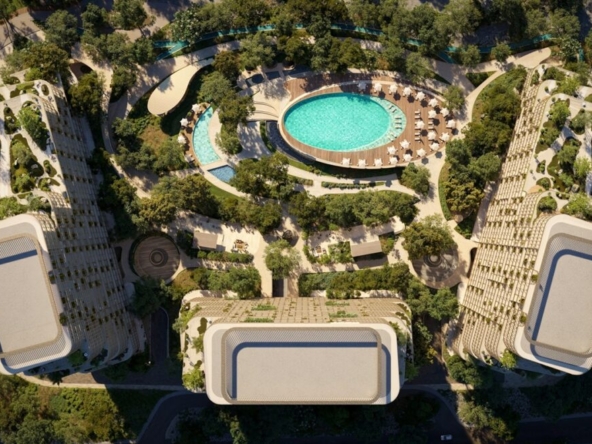Dubai’s real estate sector has long been recognized as one of the most dynamic and fast-paced in the world. Following several cycles of rapid growth, correction, and renewed expansion, the market now appears to be entering a new era—a phase of stability and maturity. Investors, developers, and global buyers are increasingly asking whether this represents a lasting shift toward sustainability or merely a pause before another wave of speculative growth.
Historical Growth of Dubai Real Estate
Dubai’s property journey has been marked by remarkable milestones. From the early 2000s, when landmark freehold laws attracted global investors, to the 2008 global financial crisis that tested resilience, the emirate has consistently demonstrated its ability to adapt. The recovery that followed Expo 2020 preparations and the influx of foreign capital during the pandemic years showcased Dubai’s strength as a real estate powerhouse.
Today, the market is no longer just about speculative surges, but about creating sustainable long-term value. Developers and policymakers are prioritizing steady growth and regulation, signaling that Dubai may be approaching its most mature phase yet.
The Shift From Boom-and-Bust to Stability
For decades, Dubai’s property market was synonymous with booms followed by corrections. High demand, ambitious mega-projects, and speculative buying created volatility. However, recent trends indicate a departure from this cycle.
Key drivers include:
-
Government regulation: Stricter oversight from the Dubai Land Department (DLD) and the Real Estate Regulatory Agency (RERA) has reduced speculative flipping.
-
Diversified demand: Buyers now include long-term expatriates, end-users, and institutional investors, not just short-term speculators.
-
Sustainable projects: Developers are shifting focus to mixed-use communities, green developments, and infrastructure-driven real estate.
This deliberate transformation positions Dubai as a stable and reliable global property hub.
Investor Confidence and Market Maturity
Rise of Institutional Investments
Unlike earlier phases dominated by individual buyers, Dubai is now witnessing a surge in institutional investors. Sovereign wealth funds, real estate investment trusts (REITs), and private equity firms are allocating capital into Dubai’s residential, commercial, and hospitality sectors. This shift indicates growing confidence in the long-term stability of the market.
Stable Rental Yields
Dubai continues to offer some of the highest rental yields globally, ranging between 6–8% in prime areas, compared to 2–4% in cities like London or New York. However, what’s more significant is the consistency of these yields, which highlights a maturing market where returns are sustainable rather than volatile.
Economic Diversification and Its Impact on Real Estate
Dubai’s leadership has strategically positioned the emirate as a diversified economy, reducing reliance on oil revenues. Key drivers like tourism, trade, logistics, finance, and technology now fuel economic growth.
-
Tourism supports demand for short-term rentals and serviced apartments.
-
Technology and startups are driving demand for flexible office spaces.
-
Global trade and logistics reinforce demand for industrial and warehouse developments.
This diversification ensures that real estate growth is not over-reliant on one sector, strengthening market resilience.
Policy Reforms Encouraging Long-Term Investment
Government policies play a crucial role in stabilizing the real estate market:
-
Golden Visa Program: Offering long-term residency for investors, professionals, and retirees has encouraged permanent settlement.
-
100% Foreign Business Ownership: Attracts entrepreneurs, indirectly boosting demand for commercial and residential property.
-
Regulatory Reforms: Enhanced transparency in transactions, escrow accounts, and stricter project oversight ensure market discipline.
These measures cultivate trust among global investors, cementing Dubai’s position as a mature real estate destination.
Luxury Segment: From Speculation to Sustainable Demand
Dubai’s luxury property segment has seen record-breaking transactions, with villas and penthouses selling for hundreds of millions of dirhams. Unlike earlier years, when luxury demand was speculative, today’s buyers are ultra-high-net-worth individuals (UHNWIs) seeking long-term residences and safe-haven investments.
The shift from quick profit-taking to wealth preservation highlights another marker of maturity. Developments in Palm Jumeirah, Dubai Hills Estate, and Downtown Dubai showcase how luxury real estate is evolving with sustainability and exclusivity at its core.
Affordable Housing and Market Balance
A mature market cannot thrive on luxury alone. Dubai has recognized the growing demand for affordable and mid-income housing. Developers are focusing on communities in areas such as Dubailand, Jumeirah Village Circle (JVC), and Dubai South.
This balance between luxury and affordability ensures inclusivity, catering to a wider demographic of residents and enhancing market stability.
Sustainability and Green Real Estate Trends
Global investors increasingly prioritize ESG (Environmental, Social, Governance) principles, and Dubai is aligning with this trend. From solar-powered communities to LEED-certified commercial buildings, sustainability is no longer optional.
Green developments not only meet investor preferences but also reduce long-term operational costs, making them attractive for end-users and institutional buyers. This commitment strengthens Dubai’s real estate maturity by aligning it with global best practices.
Challenges to Market Maturity
Despite the progress, challenges remain:
-
Global economic uncertainty may influence investment flows.
-
Over-supply risks in certain segments, especially mid-tier apartments, could pressure prices.
-
Geopolitical tensions in the region may create investor hesitancy.
However, with proactive government policies and strong fundamentals, Dubai is well-positioned to mitigate these risks.
Future Outlook: A Mature Global Real Estate Hub
Dubai’s real estate sector is set to solidify its position as a mature global hub. The combination of regulation, diversified demand, economic stability, and sustainable practices signals a new era.
Key projections include:
-
Continued growth in institutional investments.
-
Expansion of sustainable and smart developments.
-
Balanced growth across luxury, affordable, and commercial segments.
-
A long-term trajectory that emphasizes stability over volatility.
Conclusion: Stability After the Surge
Dubai has moved beyond the era of speculative surges and unpredictable corrections. The city is crafting a stable, resilient, and mature real estate market that attracts global investors seeking reliability. From luxury mansions to affordable communities, Dubai’s real estate landscape reflects a forward-looking vision rooted in sustainability, diversification, and long-term value creation.
As the emirate continues to evolve, the mature phase of Dubai real estate promises not just stability, but enduring prosperity for investors, residents, and stakeholders alike.




